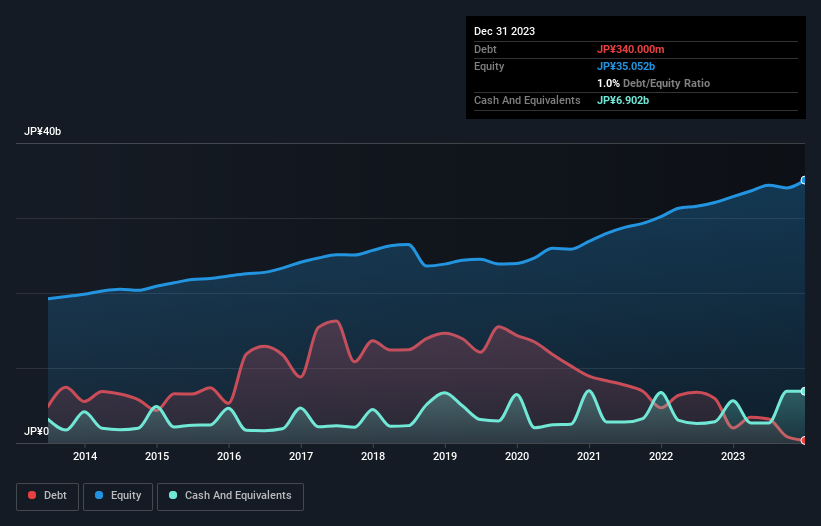- Japan
- /
- Food and Staples Retail
- /
- TSE:9823
These 4 Measures Indicate That Mammy Mart (TSE:9823) Is Using Debt Safely
Warren Buffett famously said, 'Volatility is far from synonymous with risk.' It's only natural to consider a company's balance sheet when you examine how risky it is, since debt is often involved when a business collapses. Importantly, Mammy Mart Corporation (TSE:9823) does carry debt. But the more important question is: how much risk is that debt creating?
What Risk Does Debt Bring?
Debt and other liabilities become risky for a business when it cannot easily fulfill those obligations, either with free cash flow or by raising capital at an attractive price. Part and parcel of capitalism is the process of 'creative destruction' where failed businesses are mercilessly liquidated by their bankers. However, a more common (but still painful) scenario is that it has to raise new equity capital at a low price, thus permanently diluting shareholders. Of course, debt can be an important tool in businesses, particularly capital heavy businesses. When we think about a company's use of debt, we first look at cash and debt together.
See our latest analysis for Mammy Mart
What Is Mammy Mart's Debt?
As you can see below, Mammy Mart had JP¥340.0m of debt at December 2023, down from JP¥2.00b a year prior. But on the other hand it also has JP¥6.90b in cash, leading to a JP¥6.56b net cash position.

A Look At Mammy Mart's Liabilities
According to the last reported balance sheet, Mammy Mart had liabilities of JP¥25.9b due within 12 months, and liabilities of JP¥8.02b due beyond 12 months. Offsetting these obligations, it had cash of JP¥6.90b as well as receivables valued at JP¥4.40b due within 12 months. So its liabilities outweigh the sum of its cash and (near-term) receivables by JP¥22.6b.
Mammy Mart has a market capitalization of JP¥53.5b, so it could very likely raise cash to ameliorate its balance sheet, if the need arose. But it's clear that we should definitely closely examine whether it can manage its debt without dilution. While it does have liabilities worth noting, Mammy Mart also has more cash than debt, so we're pretty confident it can manage its debt safely.
On top of that, Mammy Mart grew its EBIT by 40% over the last twelve months, and that growth will make it easier to handle its debt. When analysing debt levels, the balance sheet is the obvious place to start. But you can't view debt in total isolation; since Mammy Mart will need earnings to service that debt. So when considering debt, it's definitely worth looking at the earnings trend. Click here for an interactive snapshot.
But our final consideration is also important, because a company cannot pay debt with paper profits; it needs cold hard cash. Mammy Mart may have net cash on the balance sheet, but it is still interesting to look at how well the business converts its earnings before interest and tax (EBIT) to free cash flow, because that will influence both its need for, and its capacity to manage debt. Over the last three years, Mammy Mart actually produced more free cash flow than EBIT. That sort of strong cash generation warms our hearts like a puppy in a bumblebee suit.
Summing Up
Although Mammy Mart's balance sheet isn't particularly strong, due to the total liabilities, it is clearly positive to see that it has net cash of JP¥6.56b. The cherry on top was that in converted 108% of that EBIT to free cash flow, bringing in JP¥12b. So we don't think Mammy Mart's use of debt is risky. When analysing debt levels, the balance sheet is the obvious place to start. But ultimately, every company can contain risks that exist outside of the balance sheet. Case in point: We've spotted 1 warning sign for Mammy Mart you should be aware of.
If you're interested in investing in businesses that can grow profits without the burden of debt, then check out this free list of growing businesses that have net cash on the balance sheet.
New: Manage All Your Stock Portfolios in One Place
We've created the ultimate portfolio companion for stock investors, and it's free.
• Connect an unlimited number of Portfolios and see your total in one currency
• Be alerted to new Warning Signs or Risks via email or mobile
• Track the Fair Value of your stocks
Have feedback on this article? Concerned about the content? Get in touch with us directly. Alternatively, email editorial-team (at) simplywallst.com.
This article by Simply Wall St is general in nature. We provide commentary based on historical data and analyst forecasts only using an unbiased methodology and our articles are not intended to be financial advice. It does not constitute a recommendation to buy or sell any stock, and does not take account of your objectives, or your financial situation. We aim to bring you long-term focused analysis driven by fundamental data. Note that our analysis may not factor in the latest price-sensitive company announcements or qualitative material. Simply Wall St has no position in any stocks mentioned.
About TSE:9823
Adequate balance sheet second-rate dividend payer.
Market Insights
Community Narratives




